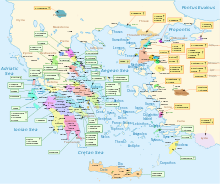Ancient Greek
| Ancient Greek | |
|---|---|
| Ἑλληνική Hellēnikḗ | |
 Inscription about the construction of the statue ofAthena Parthenosin theParthenon,440/439 BC | |
| Region | easternMediterranean |
| Era | 9th century BC to the 4th century AD |
Indo-European
| |
| Greek Alpha bet | |
| Language codes | |
| ISO 639-2 | grc |
| ISO 639-3 | grc(includes all pre-modern stages) |
| Glottolog | anci1242 |
 Map ofAncient (Homeric) Greece | |
Ancient Greekwas anIndo-European languagespoken inAncient Greecefrom about 1500BCto about 300BC.Ancient Greek andLatinare very important languages. Although they are no longer spoken, they influenced almost all modern European languages.
Greek had many differentdialects.[1]Attic Greek was spoken inAthens,the largest city, and the rest of the region ofAttica.It was thought to be the purest form of Greek. Later, in the educatedRoman world,children were taught Greek as asecond language,just as many people now learnEnglishas their second language.Koine Greekwas the common language of Greeks. It was Attic Greek mixed with several other dialects.
Homerspoke and wrote in an old dialect that was somewhat different from Attic Greek. TheIliadand theOdysseyare long poems that tell exciting stories aboutwarfare,traveland theGreek gods.In the 5th century BC, some great plays were written byAeschylus,SophoclesandEuripides.The Golden Age of Ancient Greece inspired literature that has been read forcenturies.
Attic Greek[change|change source]
Attic Greekwas the dialect that was spoken in Athens and the rest of the region ofAttica.It was the dialect most similar to later forms of Greek since it was the standard form of the language. It is studied in Ancient Greek courses because it was the most common dialect.
Changes[change|change source]
All languages change with time, and Greek has changed a great deal over 2500 years.Modern Greekis often said to have started in 1453 AD[2]afterMedieval Greekwas spoken.
Unlike Latin, Ancient Greek did not split intomany languages,but it is still considered to be a separate language fromModern Greek.The pronunciation has changed; for instance, beta was pronounced "b" in Ancient Greek, but it is pronounced "v" and is called "vita" in Modern Greek. The spelling has not changed much, which gives the appearance of less change than has actually happened. Also, many different vowels and diphthongs merged into "i", the vowel sound in the English word "ski". Thetonal systemof Ancient Greek has disappeared, but Modern Greek had only recently changed its spelling to match that change.
Despite those changes, much of the language has remarkably survived intact through the centuries.[3]There is a community nearTrabzon,Turkey,that speaks a dialect that is closer to Ancient Greek than to Standard Modern Greek.[4]

Related pages[change|change source]
References[change|change source]
- ↑Woodard, Roger D. 2008. Greek dialects, in:The Ancient Languages of Europe.R.D. Woodard (ed) Cambridge: Cambridge University Press, p. 51.
- ↑Nordhoff, Sebastianet al(eds) 2013.Ancient Greek (to 1453).Glottolog. Leipzig: Max Planck Institute for Evolutionary Anthropology.[1]
- ↑Palmer, Leonard 1996.The Greek Language.Norman, OK: University of Oklahoma Press, p. 262.ISBN0-8061-2844-5
- ↑The Independent,3 January 2011Jason and the argot: land where Greek's ancient language survives
